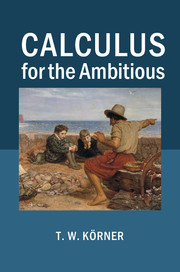Book contents
- Frontmatter
- Epigraph
- Contents
- Introduction
- 1 Preliminary ideas
- 2 The integral
- 3 Functions, old and new
- 4 Falling bodies
- 5 Compound interest and horse kicks
- 6 Taylor's theorem
- 7 Approximations, good and bad
- 8 Hills and dales
- 9 Differential equations via computers
- 10 Paradise lost
- 11 Paradise regained
- Further reading
- Index
1 - Preliminary ideas
Published online by Cambridge University Press: 05 June 2014
- Frontmatter
- Epigraph
- Contents
- Introduction
- 1 Preliminary ideas
- 2 The integral
- 3 Functions, old and new
- 4 Falling bodies
- 5 Compound interest and horse kicks
- 6 Taylor's theorem
- 7 Approximations, good and bad
- 8 Hills and dales
- 9 Differential equations via computers
- 10 Paradise lost
- 11 Paradise regained
- Further reading
- Index
Summary
Why is calculus hard?
Mathematicians find mathematics hard and are not surprised or dismayed if it takes them a long time and a lot of hard work to understand a piece of mathematics. On the other hand, most of them would agree that the only reason we find mathematics hard is that we are stupid.
The basic ideas of the calculus, like the basic ideas of the rest of mathematics, are easy (how else would a bunch of apes fresh out of the trees be able to find them?), but calculus requires a lot of work to master (after all, we are just a bunch of apes fresh out of the trees). Here is a list of some of the difficulties facing the reader.
Mathematics is a ‘ladder subject’. If you are taught history at school and you pay no attention during the year spent studying Elizabethan England, you will get bad grades for that year, but you will not be at a disadvantage next year when studying the American CivilWar. In mathematics, each topic depends on the previous topic and you cannot miss out too much.
The ladder described in this book has many rungs and it will be a very rare reader who starts without any knowledge of the calculus and manages to struggle though to the end. (On the other hand, some readers will be familiar with the topics in the earlier chapters and will, I hope, be able to enjoy the final chapters.)
- Type
- Chapter
- Information
- Calculus for the Ambitious , pp. 1 - 28Publisher: Cambridge University PressPrint publication year: 2014



